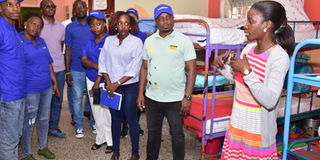Prime
Katalemwa special needs students receive relief

Olive Nabiryo, an occupational therapist at Katalemwa talks to the team that delivered relief. Photo | Charles Tabu.
What you need to know:
- Recently, Katalemwa Cheshire Home for Rehabilitation Services received an olive branch from well-wishers.
With many Ugandans still reeling from the Covid-19 pandemic after effects, spare a thought for the growing number of education seeking disabled children filling up Katalemwa Cheshire Home for Rehabilitation Services (KCH) in Gayaza, Wakiso District. The disability distress from all over the country is now largely burdened by the rehabilitation centre that was birthed more than 50 years ago as a healing subsection of Mulago Hospital.
Background
Olive Nabiryo, the occupational therapist who heads the medical section at the rehabilitation facility, says this facility started in 1970 as a home for adults for disabilities from Mulago hospital that were sent to Katalemwa to be hospitalised.
After five years it turned to children for physiotherapy and also it started offering education services. It was like a second home for patients receiving treatment from Mulago.
Over the years, KCH spread across Uganda banking on donor generosity and meagre parents’ contributions without any tangible financial support from the government.
“At KCH, we carry out awareness, prevention and cause amongst schools and communities. We encourage inclusion of disabled children into mainstream schools and, we teach others carpentry and welding to earn a living. Some affected families are given some startups to take care of children with disabilities,” says Nabiryo.
Recently, Parsha International Limited, owing to their mandate by the Lotteries and Gaming Regulatory Board (LGRB) for betting companies to do corporate social responsibility annually, gave valuable aid to autism patients at KCH.
Denis Kikonyogo, Champion Bet head of business development, says the plight of autistic patients compelled them to inject more than Shs60m worth in items into the facility.
“After giving to Teenage Mothers and Child Support Foundation (TMCSF) in Bweyogerere last year in October, we felt it was time to reach out to Katalemwa that seems neglected. We have donated scholastic materials and essential goods such as computers, rice, milk, mattresses and cooking oil worth Shs60m,” Kikonyogo says.
Such centres survive on donors when the government seems busy, he adds, “and it is incumbent upon us to do more and avail change. We are companies surviving on marginal profits but we know that these suffering children’s fathers are our customers at our betting houses so we must give back.”
The betting company visited with officials from Ministry of Finance whom they requested to tell their bosses about the apathy in society. It is their prayer that Special Grant for People with Disabilities (SGPWD), managed by the Ministry of Gender that aims to provide a social safety net for PWDs and boost their income-generating opportunities and employment generation will one day take part in the Katalemwa noble cause.
The CSR and responsible gaming officer from the National Lotteries and Gaming Regulatory Board Jackline Kamukune appreciated Parsha International Limited for being a compliant operator especially in carrying out CSR.
“Thank you for loving us. I am very sure these computers and other materials will help us in class. We really appreciate,” says Ivy Namaganda a Primary Five pupil on behalf of her peers.
The core mission of KCH, a disability-focused NGO that provides rehabilitation services to children and young persons with disabilities, is to provide quality medical care, social economic support and fabrication of orthopedic appliances.
They do this through a network of partner organisations, centre and community based inclusive development (CBID), rights-based programming (RBP) and working with families, communities, civil society, development partners and government.
Challenges
The facility administration headed by Samali Matovu incurs high taxes imposed on educational and medical imported system devices yet they are dealing with the needy.
The facility administration feels that they are complimenting the government health realm, but they are not well appreciated and only benefit when they utilise their regional hospitals.
Uganda adopted a National Policy on Disability in 2006 which calls for the provision of support and legal protection for persons with disabilities (PWDs). It mandates local authorities to organise supportive resources and implement activities beneficial to PWDs.
Quick notes
According to a Unicef published report in 2017, there has been a lack of comprehensive disability orientation programmes established, and a large implementation gap remains.
The government provides a few programmes which are grossly limited in terms of reach and social protection qualities. Community-based rehabilitation (CBR) activities provide PWDs with increased access and mobility.




